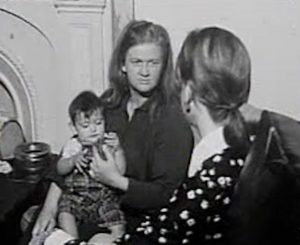Allan Hogan, Communications Convenor, Bulletin 4/2022, June 2022

It’s clear from the many tributes to Caroline Jones following her recent death that she was widely admired and respected by her colleagues and the wider community. She was first and foremost an excellent journalist but also a trailblazer for other women to enter what was a male-dominated profession. I had the pleasure of working with her on Four Corners – she was not just a colleague, but a friend, and I admired the humility that hid her keen intelligence and ability.
I met her in the early ’70s when she was a reporter on This Day Tonight (TDT), shortly before she became the presenter of Four Corners. A report she produced in 1972 focused on families living in the Glebe Estate, at that time, the huge swathe of land and cottages owned by the Anglican Church near St John’s Church. The Estate had become a major headache for the Church; the residents’ 99-year leases had come to an end. They were poor and battled to find their weekly rent. Neglect and lack of maintenance had turned the place into a slum, and the Church couldn’t (or wouldn’t) spend the money needed to fix it.
Caroline took the TDT camera to the Estate where she interviewed Mrs Betty Darcy. I have a copy of the story in my archives, and watching it fifty years on still brings tears. Betty was the mother of three children, aged four, two and eleven months. Her husband brought home $50 a week, and they received $3.50 a week in child endowment. (That’s an income of roughly $30,000 a year in today’s money). Their rent was $22 a week, almost half of their income.

Betty told Caroline the house had no kitchen sink – they washed up in the baby’s bathtub. The bathroom had a cold shower, and if they needed hot water, they used the copper. The three children shared a bed in a hallway, which was nevertheless classed as a bedroom by the landlord. The grainy black and white images of the bathroom and kitchen show the tragedy of their primitive living conditions. Betty is stoic in the face of Caroline’s questions about her life; it’s as if she has no greater expectations. It’s time for the tissues when, at the end of the interview, Caroline asks Betty what she would do if she had a bit more money. ‘Oh, I’d love to see some nice flowers’.
Caroline’s TDT report shocked viewers, many of whom were seeing for the first time what living in poverty looked like in Australia. And although the expression ‘slum landlord’ was never used in the story, it was clear that, in the case of the Glebe Estate, that was an accurate description of the Anglican Church. Church leaders complained that the ABC story had been unfair, although a prominent Bishop agreed that ‘Anglicans were saddened and not a little embarrassed at seeing the very decrepit conditions of houses owned by the Church in the Sydney Glebe area, and by the talk of evictions for non-payment of rents.’
The Church thought that the best solution to its problem was to sell the Estate to developers, knocking down the historic cottages without concern for the community that had taken root there. At first, the Glebe Society (then in its infancy) thought this might be the best solution but, after more consideration, decided that preservation of the historic streetscapes and community was worth fighting for.
In December 1972, Australia elected Gough Whitlam as Prime Minister of a reforming Labor government. His Minister for Urban Affairs, Tom Uren, bought the Glebe Estate from the Anglican Church for $17.5 million dollars, and began a program of ‘urban rehabilitation’. That saved it from destruction and gave us the legacy of the Estate as it stands today. Unfortunately, it’s not safe from further predations by developers, while the current government turns a blind eye to ‘demolition by neglect’.
In 1973 Caroline Jones won a Logie Award for ‘Outstanding Contribution to Television Journalism’, and her Glebe Estate report was firmly in the judges’ minds when they made the award. In 1997, The National Trust of Australia voted Caroline an Australian Living Treasure. Her contributions to broadcasting and journalism, including Australian Story and The Search for Meaning, have guaranteed her a place in the pantheon of Great Australians.
By my reckoning, Betty Darcy’s children would now be in their 50s, and it would be wonderful if we could make contact with them and hear the stories of their childhood and later life.








There are no comments yet. Please leave yours.